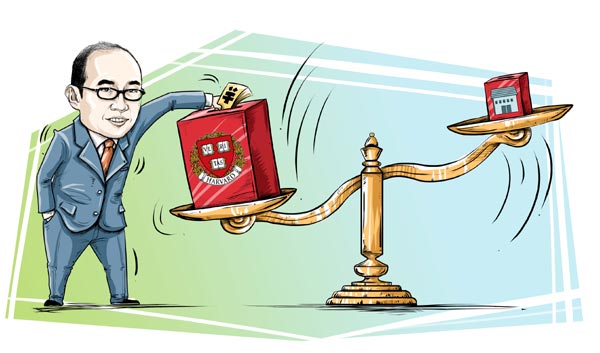 The 4th Chinese National Pole Dance Championship held in Tianjin
The 4th Chinese National Pole Dance Championship held in Tianjin
 Chinese navy commandos debut at 2014 RIMPAC
Chinese navy commandos debut at 2014 RIMPAC
 Guangxi impression: scenic countryside
Guangxi impression: scenic countryside
 World's largest aquatic insect found in Sichuan
World's largest aquatic insect found in Sichuan
 Ceremony volunteers for Youth Olympics make public appearance
Ceremony volunteers for Youth Olympics make public appearance
 A glimpse of female crew of Liaoning aircraft carrier
A glimpse of female crew of Liaoning aircraft carrier
 Stills from "Dad, where are we going?"
Stills from "Dad, where are we going?"
 Legless man's happy life
Legless man's happy life
 Top ten most beautiful islands in China
Top ten most beautiful islands in China
 Aerial view of Hong Kong
Aerial view of Hong Kong
 |
| Wang Xiaoying / China Daily |
Most Chinese now totally get this. Had this happened a decade or two ago, public feedback would have been predominantly negative, I'm certain, because most would have equated such an act with a lack of patriotism. This feeling still lingers, but it's shared by fewer and fewer people because the public can more easily understand the distinction between public and private rights.
A few years ago, Zhang Lei, a Chinese financier, donated $8.88 million to Yale University, his alma mater. Had he been better known, he would have borne the brunt of a major ill-will campaign.
Detractors, for all their misplaced zeal to dictate private citizens' choice of charity, do apply a crude principle of economics when they see something like that. For a school such as Harvard, they reason, this money is the icing on the cake. It has so many donors that Pan's money would not yield the highest return on investment, if it is seen as an investment.
More bang for your buck
Ordinary Chinese do not use calculus to figure out which school needs donations the most, but we do have two colorful sayings that correspond to the rule of microeconomics: "Adding flowers to a big bouquet", and "Sending charcoal to someone trapped in snow." You get more bang for your buck if you do the latter, but that will require independent thinking.
Most investors, professional or otherwise, would follow the herd mentality and chase objects everyone else is already hotly pursuing. You would feel you have rubbed off some of the glitter if you give money to Harvard or Tsinghua University in China. In fact, the top universities in China get proportionately much more in both private donations and public funding. They are the largest, most-prominent bouquets in the garden of higher education, and throwing roses or petals at them would probably yield more psychological returns than tangible ones.
By this yardstick, the problem with charity recipients is not their nationality, but rather which is in dire need of such help. Harvard may have a much larger budget than Tsinghua, which, in turn, is much better funded than a regular college in China. The ones most worthy of such financial assistance, as the logic goes, are those in poverty-stricken areas that cater to the lowest-income families.
 |  |
 Blockbuster? No, it’s firefighters’ posters
Blockbuster? No, it’s firefighters’ posters
 Special 'gifts' for IT men for Chinese Qixi Festival
Special 'gifts' for IT men for Chinese Qixi Festival
 Foreign students' colorful life in China
Foreign students' colorful life in China
 French photographer‘s work 'China 2050' goes viral online
French photographer‘s work 'China 2050' goes viral online A bite of Halal Food
A bite of Halal Food
 Dressed in uniforms to marry you
Dressed in uniforms to marry you
 Female soldier in Chinese special force
Female soldier in Chinese special force
 Zhujiang ambassadors attend lotus lanterns activity
Zhujiang ambassadors attend lotus lanterns activity
 From girly girl to tough special police officer
From girly girl to tough special police officer
 22-year-old veteran travels around China
22-year-old veteran travels around China
 Night scenery of pagoda forests
Night scenery of pagoda forests China suffers from hot summer
China suffers from hot summer 48 hours after super Typhoon Rammasun
48 hours after super Typhoon Rammasun German pianist plays mid-air ‘magic carpet’ show over Munich Airport
German pianist plays mid-air ‘magic carpet’ show over Munich Airport
 China's manned deep-sea submersible conducts dive in Pacific Ocean
China's manned deep-sea submersible conducts dive in Pacific Ocean
Day|Week|Month